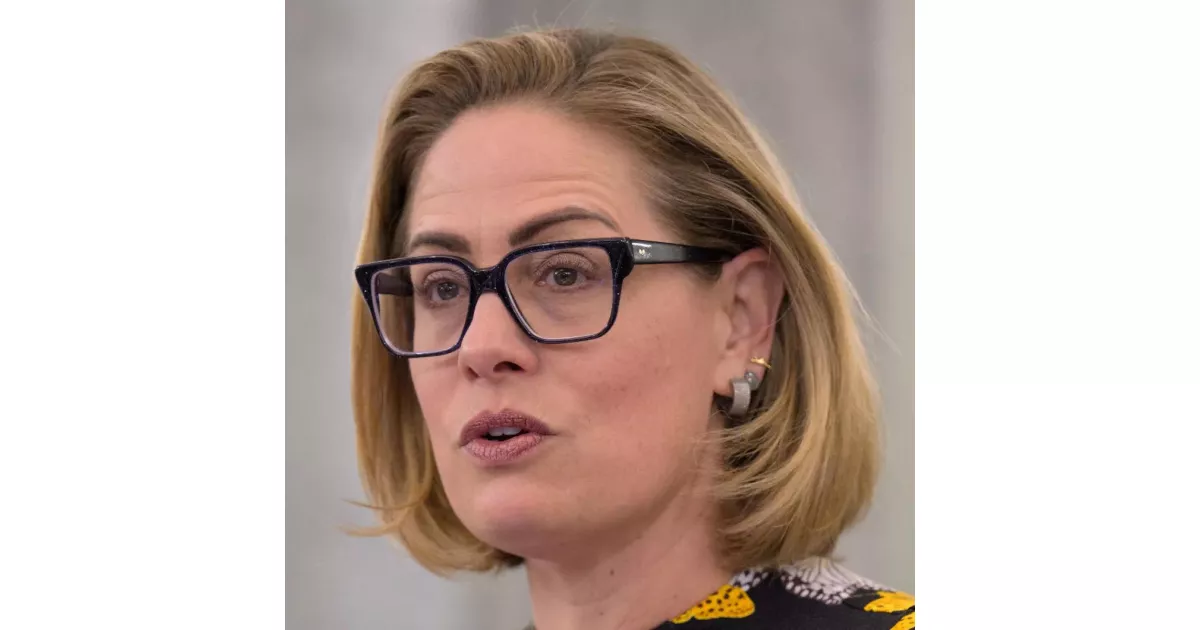How Kyrsten Sinema built a successful career. Explore key moments that defined the journey.
Kyrsten Sinema is an American politician who served as a U.S. Senator for Arizona from 2019 to 2025. Initially a Democrat, she became an independent in December 2022. Before entering politics, Sinema worked as a social worker.
1977: Dennis DeConcini Held Senate Seat
In 1977, Dennis DeConcini began representing Arizona in the United States Senate, a seat he held until 1995. Kyrsten Sinema is the first Democrat elected to represent Arizona in the chamber since DeConcini.
1995: Dennis DeConcini Left Senate Seat
In 1995, Dennis DeConcini left his seat representing Arizona in the United States Senate, a seat he had held since 1977. Kyrsten Sinema is the first Democrat elected to represent Arizona in the chamber since DeConcini.
2000: Works on Nader's Campaign
In 2000, Sinema worked on Ralph Nader's presidential campaign.
2001: Runs for Local Office
In 2001, Sinema ran for local elected office as an independent.
2002: First Run for Arizona House
In 2002, Sinema ran for the Arizona House of Representatives as an independent affiliated with the Arizona Green Party but finished last in a five-candidate field.
2003: Adjunct Professor at ASU
In 2003, Sinema became an adjunct professor teaching master's-level policy and grant-writing classes at Arizona State University School of Social Work and an adjunct business law professor at Arizona Summit Law School.
2004: Elected to Arizona House
In 2004, Sinema and David Lujan were elected to the Arizona House of Representatives for the 15th district.
2004: J.D. Degree and Criminal Defense Lawyer
In 2004, Sinema earned a J.D. degree from Arizona State University College of Law and began working as a criminal defense lawyer.
2004: Joins Democratic Party
In 2004, Sinema left the Green Party and joined the Arizona Democratic Party.
2004: Lieberman Presidential Bid
In 2004, Sinema protested Joe Lieberman's presidential bid, calling him a shame to Democrats.
2005: State Representative
In 2005, Sinema began serving as a state representative for the 15th legislative district, a role she held for three terms.
2005: Air America Radio Show
In 2005, Sinema co-hosted an Air America radio show with 9/11 truther Jeff Farias.
2005: First Public Comment as Elected Official
In 2005, Sinema's first public comment as an elected official came after a Republican colleague's speech insulted LGBT people; she declared, 'We're simply people like everyone else who want and deserve respect,' and later confirmed 'Duh, I'm bisexual.'
2006: DREAM Act Bill Sponsor
Also in 2006, she sponsored a bill urging the adoption of the DREAM Act and co-chaired Arizona Together.
2006: Most Liberal Member
In 2006, Sinema told a radio host that she was "the most liberal member of the Arizona State Legislature".
2006: Opposition to Amendment Banning Same-Sex Marriage
In 2006, Sinema was among the leading opponents of a proposed amendment to the Arizona state constitution that would have banned same-sex marriages and civil unions. The proposal failed in Arizona.
2008: Opposition to Second Amendment Banning Same-Sex Marriage
In 2008, Sinema opposed a second proposed amendment to the Arizona constitution banning only same-sex marriage, which passed despite her opposition.
June 2009: Obama Health Reform Task Force
In June 2009, Sinema was appointed to the White House Health Reform Task Force by President Barack Obama, which helped shape the Affordable Care Act.
2009: Assistant Minority Leader
In 2009, Sinema became the assistant Minority Leader for the Democratic Caucus of the Arizona House of Representatives.
March 2010: Attends Obamacare Bill Signing
In March 2010, Sinema was invited to attend the Obamacare bill signing at the White House due to her hard work in improving the bill.
2010: Assistant Minority Leader
In 2010, Sinema continued as the assistant Minority Leader for the Democratic Caucus of the Arizona House of Representatives.
2010: Elected to Arizona Senate
In 2010, Sinema was elected to the Arizona Senate, defeating Republican Bob Thomas.
June 2011: Considering Run for U.S. House
In June 2011, Sinema said she was considering running for the U.S. House of Representatives in 2012 but would not challenge another Democrat in a primary.
2011: State Senator
In 2011, Sinema became the state senator for the 15th legislative district.
January 3, 2012: Announces Bid for Congress
On January 3, 2012, Sinema announced her bid for Congress in the 9th congressional district.
August 28, 2012: Wins Democratic Primary
On August 28, 2012, Sinema won the three-way Democratic primary with nearly 42 percent of the vote.
2012: Joining Congress and Evolving Views
After joining Congress in 2012, Sinema stated that her views on military force had "evolved", acknowledging the need to consider military intervention as an option.
2012: Election to Congress
In 2012, Sinema was elected to Congress, marking a shift in her public profile to a more moderate stance.
2012: Election to US House of Representatives
In 2012, Sinema was elected to a seat in the United States House of Representatives.
2012: Campaign Website Statement on Immigration
In 2012, Sinema's campaign website stated the need for "a tough but fair path to citizenship for undocumented workers" requiring them to pay back taxes, pay a fine, and learn English.
2012: Declines to Discuss Bisexuality
In 2012, while running for U.S. House, Sinema said she did not remember disclosing her sexual orientation in 2005 and declined to discuss the significance of being the first openly bisexual member of the House.
2012: Call for Affordable Care Act Reforms
In a 2012 congressional campaign debate, Sinema called for reforms to the Affordable Care Act, stating that it was not perfect and that she would work to amend it in Congress.
June 2013: Cosponsorship of LIBERT-E Act
In June 2013, Sinema became one of 29 original cosponsors of the bipartisan LIBERT-E Act, which aimed to limit the NSA's collection of electronic information to subjects of an investigation.
July 2013: Vote Against Amendment on NSA Monitoring
In July 2013, Sinema joined a bipartisan majority and voted against an amendment to a defense appropriations bill that would have prohibited the NSA from monitoring and recording details of U.S. citizens' telecommunications without a warrant.
2013: US Representative
In 2013, Sinema began serving as the United States representative for the 9th district.
2013: Co-Sponsorship of Letter Opposing Saudi Arabia
In 2013, Sinema co-sponsored Rep. Sean Patrick Maloney's letter, which opposed Saudi Arabia for "the use of torture and capital punishment against the LGBTQ community".
2013: Supports Swaps Regulatory Improvement Act
In 2013, Sinema supported the Swaps Regulatory Improvement Act of 2013, which sought to exempt certain financial instruments from some Dodd-Frank restrictions.
2013: Vote for Keep Your Health Plan Act
In 2013, Sinema voted for the Keep Your Health Plan Act.
August 26, 2014: Unopposed in Democratic Primary
Sinema ran for reelection in 2014 and was unopposed in the Democratic primary, which took place on August 26, 2014.
September 2014: Endorsed by U.S. Chamber of Commerce
In September 2014, Sinema was endorsed for reelection by the U.S. Chamber of Commerce.
2014: Vote to Delay Insurance Fines
In 2014, Sinema voted to delay the imposition of fines on those who did not purchase insurance under the Affordable Care Act.
2015: Publication of Dissertation
In 2015, Lexington Books published Sinema's doctoral dissertation on the 1994 Rwandan genocide, titled "Who Must Die in Rwanda's Genocide?: The State of Exception Realized."
2015: Co-sponsors Anti-Regulation Bills
In 2015, Sinema co-sponsored other anti-regulation bills, including the Systemic Risk Designation Improvement Act of 2015.
2016: Vote on FCC Regulation of Broadband Rates
In 2016, Sinema was one of five House Democrats to vote for a Republican-backed bill barring the Federal Communications Commission (FCC) from regulating broadband rates.
September 28, 2017: Announces Senate Candidacy
On September 28, 2017, Sinema officially announced her candidacy for the Class I United States Senate seat.
April 2018: Fundraising Totals Revealed
In April 2018, Federal Election Commission filings indicated that Sinema had raised over $8.2 million, surpassing the combined total of the three leading Republican primary contenders.
July 2018: Vote Against Abolishing ICE
In July 2018, Sinema broke with her party by voting with Republicans against abolishing ICE (Immigration and Customs Enforcement).
September 2018: Senate Campaign Described as Moderate
In September 2018, Jonathan Martin wrote in The New York Times that Sinema was running a cautious Senate campaign, avoiding controversial issues and keeping the media at arms-length. He noted that she had few major legislative accomplishments and was running on a political image shaped over the years, highlighting her childhood homelessness.
2018: McSally Opposed Sinema in General Election
In 2018, Martha McSally was Sinema's general election opponent, but would later serve alongside her as a colleague. Kelly defeated Sinema's 2018 general election opponent, Martha McSally, who was appointed to fill the Senate seat vacated upon the resignation of Jon Kyl, who had been appointed to fill the Senate seat vacated upon the death of John McCain.
2018: Won the August Democratic primary
In 2018, Sinema refused to debate her competitor Deedra Abboud in the Democratic primary, later winning the August Democratic primary for the Senate seat. Her Republican opponent in the general election was Martha McSally. She received the endorsement of the Human Rights Campaign.
2018: Elected to the Senate
In 2018, Sinema won the Senate election, replacing Jeff Flake, and became the first openly bisexual woman elected to the Senate from Arizona.
2018: Criticism of Democratic leadership
In the summer of 2018, Sinema stated that if elected to the U.S. Senate, she would vote against Chuck Schumer for Minority Leader, citing the Democratic leadership's failure to support Democrats across the country and expressing the need for the party to grow and change.
January 3, 2019: Sworn into US Congress
On January 3, 2019, Kyrsten Sinema was sworn in with the 116th United States Congress after many news sources called the U.S. Senate race for her on November 12 and her Republican opponent, Martha McSally, conceded.
February 12, 2019: Vote for Natural Resources Management Act
On February 12, 2019, Sinema voted along with the whole Senate for the Natural Resources Management Act, which provides for the management of the natural resources of the United States.
February 14, 2019: Vote to Confirm William Barr
On February 14, 2019, Sinema voted to confirm William Barr as attorney general.
February 2019: Sponsorship of Employer Participation in Repayment Act
In February 2019, Sinema co-sponsored the Employer Participation in Repayment Act, which would allow employers to contribute up to $5,250 to their employees' student loans.
March 14, 2019: Vote Against National Emergency Declaration
On March 14, 2019, Sinema voted against Trump's National Emergency declaration on border security.
April 2019: Confirmation Vote for David Bernhardt
In April 2019, Sinema was one of three Democrats who voted with Republicans to confirm David Bernhardt, a former oil executive, as Secretary of the Interior Department.
2019: Net Neutrality Bill
In 2019, Sinema was the sole Senate Democrat not to co-sponsor the Save the Internet Act, which would restore Obama-era regulations preventing ISPs from throttling consumers' website traffic. She worked with Senate Republican Roger Wicker to develop their own net neutrality bill.
2019: End of US Representative term
In 2019, Sinema's term as the United States representative for the 9th district ended.
January 6, 2021: January 6 Commission
On January 6, 2021, Sinema urged Senate colleagues to vote in favor of the proposed January 6 commission to further investigate the storming of the United States Capitol, but she did not vote due to a personal family matter.
January 2021: Voting Record
According to FiveThirtyEight, as of January 2021, Sinema had voted in line with Donald Trump's position on legislation about 50% of the time, leading the Arizona Democratic Party to suggest censuring her.
January 25, 2021: Opposition to Eliminating the Filibuster
On January 25, 2021, a spokesperson for Sinema told The Washington Post that she is "against eliminating the filibuster" and "not open to changing her mind" on the issue.
February 4, 2021: Vote Against COVID-19 Support for Undocumented Immigrants
On February 4, 2021, Sinema voted against providing COVID-19 pandemic financial support to undocumented immigrants.
February 12, 2021: Opposition to Minimum Wage Increase
On February 12, 2021, Sinema announced her opposition, joining Joe Manchin, to including a $15/hour minimum wage in a COVID-19 relief bill.
March 5, 2021: Vote Against Minimum Wage Increase
On March 5, 2021, Sinema voted against Senator Bernie Sanders' proposal to increase the federal minimum wage to $15 an hour as part of the American Rescue Plan Act of 2021, using a thumbs-down gesture.
October 8, 2021: Opposition to Prescription Drug Pricing Reform
In 2021, Sinema opposed prescription drug pricing reform proposals in House and Senate versions of a Democrat-crafted spending bill. On October 8, 2021, Jacobin reported on this.
October 18, 2021: Discussion of Concerns with Bills
On October 18, 2021, Politico reported that Sinema and Senator Joe Manchin met with President Biden the same day to discuss their concerns with the bills.
January 2022: Vote Against Senate Filibuster Rule Change
In January 2022, Sinema and Joe Manchin voted against changing the Senate filibuster rule, leading to censure by the Arizona Democratic Party executive committee.
July 2022: Voted With President Biden
According to FiveThirtyEight, as of July 2022, Sinema had voted with President Biden's position on legislative issues 94% of the time.
December 2022: Sinema Becomes Independent
In December 2022, Kyrsten Sinema, formerly a member of the Democratic Party, became an independent.
December 2022: Party Registration Changed
In December 2022, Sinema changed her party registration to independent.
December 2022: Lead Cosponsor of Respect for Marriage Act
In December 2022, Sinema was a lead cosponsor and negotiator on the Respect for Marriage Act, which passed the Senate.
2022: Vote for Inflation Reduction Act
In 2022, Sinema voted for the Inflation Reduction Act, a major climate and energy bill designed to invest in renewable energy and provide billions for drought relief.
2023: Border Crisis Negotiations
Late in 2023, Sinema was brought in as a mediator between Chris Murphy and James Lankford to negotiate a bill addressing the Mexico–United States border crisis.
March 5, 2024: Sinema Announces No Reelection Bid
On March 5, 2024, Sinema announced that she would not seek reelection.
December 2024: Vote to Block NLRB Renomination
In December 2024, Sinema, along with Joe Manchin and Republican senators, voted to block Lauren McFerran's renomination to the National Labor Relations Board (NLRB), potentially shifting control to Republicans.
2025: Joins Coinbase Global Advisory Council
In 2025, Sinema joined the Coinbase Global Advisory Council, advocating for a modern financial system where individuals control their financial futures.
Mentioned in this timeline

Bernie Sanders is a prominent American politician currently serving as...

John F Kennedy JFK was the th U S President...

The White House located at Pennsylvania Avenue NW in Washington...
Saudi Arabia officially the Kingdom of Saudi Arabia KSA is...
Arizona is a landlocked state in the Southwestern U S...
Iraq officially the Republic of Iraq is a West Asian...
Trending

52 minutes ago T20 World Cup: Australia's struggles, Pakistan advances, and rain impacts matches.
52 minutes ago Eva Marcille Remarries Ex-Husband Plus ANTM and Netflix Documentary Updates

53 minutes ago Brittany Bowe and Hilary Knight, Team USA Stars, Announce Engagement at Olympics
53 minutes ago Prince William discusses mental health, male suicide, and talking to his children.

53 minutes ago Rublev vs Tsitsipas: Qatar ExxonMobil Open Prediction, Odds, and Preview for 2026
53 minutes ago Trump Launches 'Board of Peace' with Gaza Pledge, Allies Expressing Wariness and Distrust.
Popular

Jesse Jackson is an American civil rights activist politician and...
Randall Adam Fine is an American politician a Republican who...

Pam Bondi is an American attorney lobbyist and politician currently...

Barack Obama the th U S President - was the...

Martin Luther King Jr was a pivotal leader in the...

Ken Paxton is an American politician and lawyer serving as...

